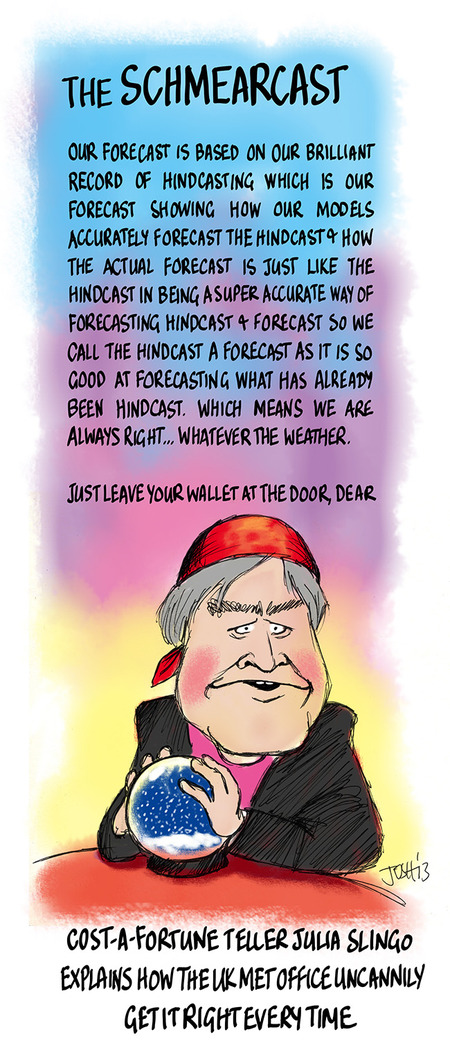Monday
Jan282013
by  Josh
Josh
 Josh
Josh We told you so - Josh 197
 Jan 28, 2013
Jan 28, 2013  Climate: MetOffice
Climate: MetOffice  Josh
Josh Update on Jan 28, 2013 by
 Josh
Josh
 Josh
Josh
Richard Tol makes a very good point so I have changed the title from 'Predicting the past' to 'We told you so'.




Reader Comments (59)
SORRY - I CAN spell 'computer'...
Someone peer-review my work, please....!
"The latter is fraught with risks of tampering, pampering, over-fitting, and perhaps other specific-goal dominated temptations".
Time for a rain-check John. Your post is actually more-or-less complete garbage. Shame when you'd started to build up a reputation for informed but understated gravitas.
Silly boy.
Simon
Could you try to be a bit more polite please.
Simon
"A word means what it means, not what you'd like it to mean."
You forget that this is MO Wonderland, where everything means just what they want it to mean.
BTW, I notice that the MO forecast for the weekend is edging downwards - Saturday was +5deg yesterday, now +4, in line with Piers Corbyn's prediction, five weeks ago, that it would be cold...
Slingo
"what these models are is hundreds and thousands"
That could explain a lot.. :-)
simon abingdon (7:22PM) What a tawdry comment to make.
I note your hot-headed reaction to my remarks. I wonder which were the trigger words?
@John Shade (Jan 30 10:10 AM )
Sorry John for any offence; I was actually trying to be constructive. I suppose the trigger words were "tampering, pampering". But mainly I have to admit that I was irritated by your successful interruption of my serious attempted exchange with Richard Tol and steven mosher. No matter, the opportunity passed. No hard feelings (from me certainly). All the best, simon.
Simon, thank you very much for taking the trouble to respond to my little cri-de-coeur in response to your previous comments. Much appreciated.
I had not intended to interrupt any dialogue. I thought my comment was relevant to both ‘sides’ – those who want to reserve the word ‘prediction’ strictly for future events, and those who are happy to use in for simulated prediction of existing ones. My key point was not on the language issue, but on the substantial difference in context between these two activities.
Re the two words which you mention, let me enlarge upon my usage of them which is based on my industrial experience.
Pampering: often used in the context of prototype development. A new product might receive a great deal of expert attention late in the R&D stage and be declared ready for routine production only to cause no end of problems when it gets there and suffers from a shortage of the ‘pampering’ it had received earlier. By analogy forecasting techniques under development can show a performance that will not be replicated in routine use by others.
Tampering: often used in the context of unwise interference in routine processes, for example treating excursions of some measured quantity as if they were signals of change rather than just ‘noise’ can lead to overadjustment and thence an increase in the variability of the process output. But it can be used in a more general way. When a process has been set performance targets outside its capability, and people are under pressure to achieve them, there are 3 main responses: tamper with the data, tamper with the process, improve the process. For example, using tree ring measurements as surrogates to capture small changes in temperature. You could be very selective in the tree data you use, you could modify the analysis method to suit, or you could try to get an improved understanding of the relation between temperatures tree rings. The hockey stick fiasco illustrated the first two choices. Anyway, in the context of forecasting, the temptation is also to be very selective about the data (e.g. ‘we’ll remove these events from the test data set since they don’t really fit’) or about the method (e.g. ‘let’s just add a compensation for September forecasts whenever a high August is preceded by relatively low values in July’).
As for GCMs, I know so little about their details that I am merely speculating about them. But it seems possible that when they are running for days, weeks, and even months at a time to simulate say 100 years of operation, there will be monitoring and adjustment taking place with an eye on the final result. Adequately alarming forecasts have also become political and financial imperatives for many influential and powerful people who seem to want there to be a climate crisis underway.
Anyway, I am not at all offended by your remarks. If anything, you flattered me greatly with your talk of ‘understated gravitas’. I too have made hasty comments on blogs which I later regretted or at least was surprised by how other people took them. So many climate topics are fraught these days, that it behoves us all to give each other a bit of slack. Not least when we may have been a little slack in doing that - as I was too. I apologise for the word 'tawdry' - that was far too harsh, and didn't help at all.
John, thanks for your generous response. I had not realised that the phrase "pampering and tampering" had a history. I am now better informed. Thank you. (By the way, before you pull me up on it, I refuse to spell realise with a "z" despite such being the surprisingly preferred alternative.) Cheers, simon